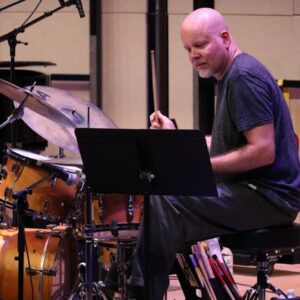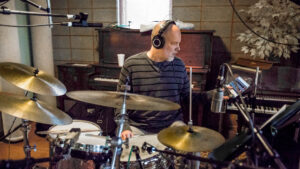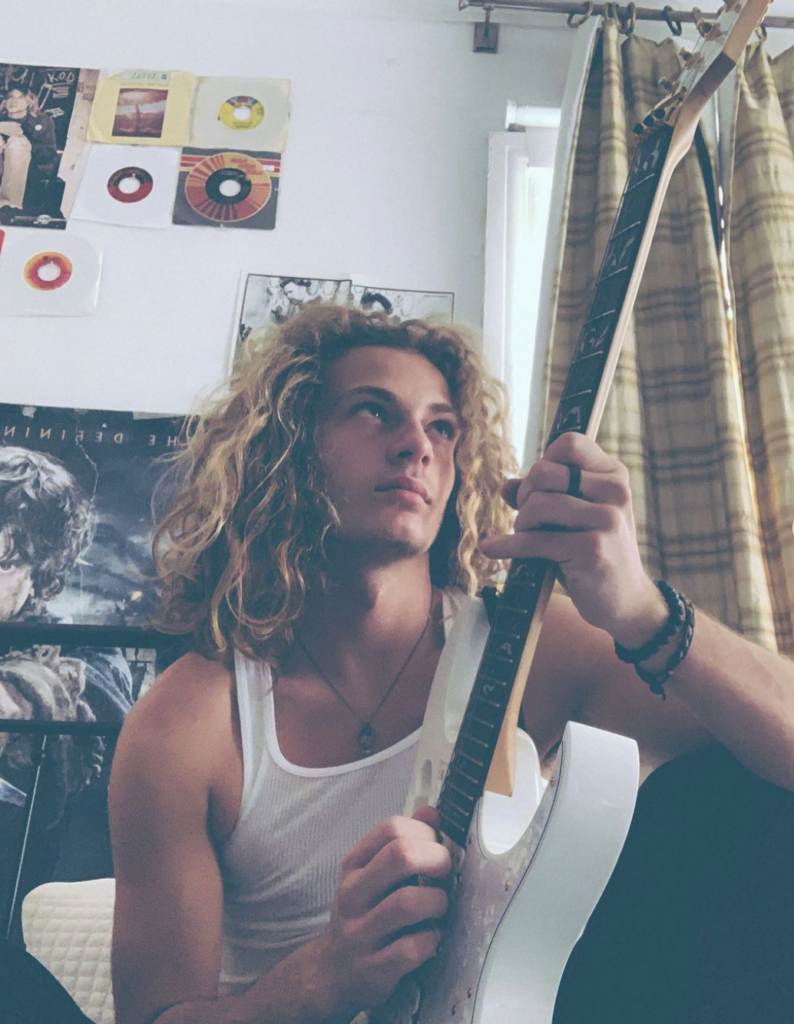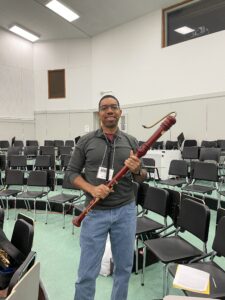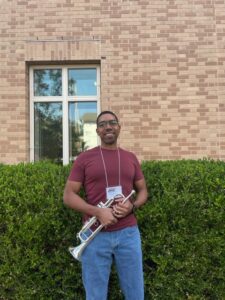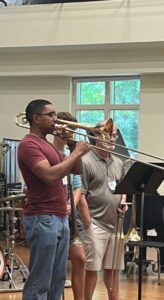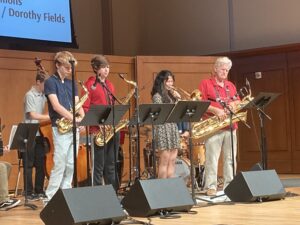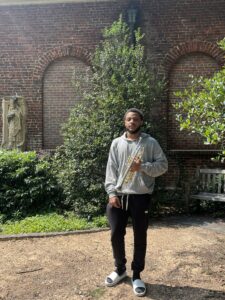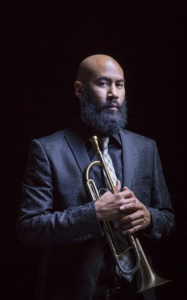By Niall Fulghum and Adley Calhoun
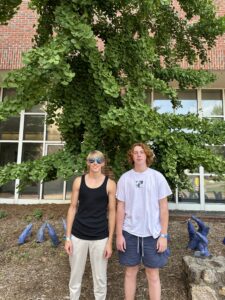
The UNC Summer Jazz Workshop is in full swing with only one day left. To get a better understanding of what the workshop is like, we interviewed Ben Hinkle and Wesley Ashley, two rising high school seniors from Charlotte, North Carolina.
How did you guys meet?
BH: Technically, we met in elementary school, but really kind of became friends in seventh grade.
WA: Yeah, seventh grade is when we actually became like solid friends.
When did you each start playing music?
BH: I started drums when I was four. It’s weird because it’s not one of those things where my parents forced me to, I just kinda begged them for a drum set. I don’t know how that happened, I don’t know how I knew what that was or anything but I just kinda did and it just kinda went on from there.
WA: My parents put me in classical piano lessons pretty early on, like around fourth grade. But even before that, they would put me in classes, like a Kindermusik thing, and I think I really liked that. I picked guitar up, I got kinda bored with classical piano so I transitioned into that. But I also kept piano as something as well.
How old were you when you switched?
WA: Middle school.
What made you want to play the instrument that you play?
BH: I can say right now I still like playing drums a lot just because I definitely think it’s the most fun and even though there’s not a melodic aspect you know, I think the rhythm is just really important and cool. And you can kind of do it forever.
WA: Everyone has like something that they do to just kind of, I don’t know, have an outlet and you know of course everyone has multiple outlets. I would just say it’s another really strong outlet that like, I know I can consistently have.
What type of music do you listen to? What are your favorite types of music to play?
BH: I honestly like to listen to a lot of the music that like normal people listen to. Like I listen to a ton of hip-hop, I love Pop Smoke, you know, I love all of those guys. When it comes to other genres, I like listening to fusion, like Snarky Puppy is one of my favorite bands.
WA: Yeah I agree, like fusion guys, like Lee Ritenour is a crazy guitarist, he’s really good…John Scofield…but yeah we both kind of have weird stuff stashed within our liked songs on Spotify, like people go through mine and are like “this doesn’t make sense”. I like Death Grips and then I’ll go into Scofield and then I’ll have like Katy Perry. I’d say I mostly like to play jazz standards, but we also mess around with a lot of rock stuff too just to have fun.
BH: Yeah I like playing standards as a group just because it’s easy to do, but when I’m on my own I’ll try to play music that is kind of complicated with really good drummers and a lot of it isn’t jazz. I like to play Rush a lot, Led Zeppelin, those big guys; and a lot of times when I am by myself I do not play songs as much as I just practice my rudiments and stuff like that.
When did you get into playing jazz?
BH: For me, jazz definitely was not from the beginning, it was not one of my first choices, but one of my teachers is a really good jazz player on drum set and he showed me how much of an art form it is compared to a lot of the other genres because you have to be a lot more intent with how you play and it’s really good to just explore other genres and everything. I’d say it still might not be my first genre but it’s really important to understand.
WA: I actually started playing jazz like on piano. When I would get really bored I would just loop 2-5-1’s or whatever and just like improvise right hand but then I realized I should just do this on guitar cause I just liked that even more, so then I just started learning more standards on guitar, I guess, putting a picture together about how I can interpret them on my own.
What brings you to the workshop?
BH: The biggest thing is I thought it was really important to play with other people that I don’t usually play with and learn how to play in a different setting, because I don’t play with as many people as I want to and this helps me learn how to fit into a band.
WA: Yeah, it’s definitely exciting to just be around musicians constantly, cause you always have the opportunity to make music together. I mean Jazz is so collaborative that it’s helpful to have everyone around. I know me and you, we try to do stuff but it always resorts to rock stuff with like four people, like Men I Trust, we play some of that.
Are you guys staying on campus this week or are you commuting?
WA: We are staying on campus.
How has that been?
WA: It has been really nice, our dorm room was actually a lot nicer than I thought it was going to be, and we were able to room together.
Which combo are you a part of? What have you learned from that specific instructor?
BH: My instructor is Dr. Greg Gelb. One of the biggest things that I have really learned in my combo is a lot of the rules that drummers have to follow when they are playing with the band, and how they are charged with keeping time, but also making sure that everyone knows what section they are going into and making sure that everyone is following like the roadmap. And you also need to be really attentive to how you play during solo’s, and making sure that for everyone’s solo you are playing a little differently.
WA: Mine is Ms. Becca Clemens. She emphasized that the role of the guitarist is to kind of just float on top of the bass player. And she was talking to the whole rhythm section when she said this, but that we all need to be in communication with each other, like always be looking up. I mean obviously, know where you are in the music, but also make eye-contact with people to ensure that you are together. We are not used to that.
How do you feel about your upcoming performances on Friday?
BH: I feel really good about the performance. I think that it is going to be really nice, everyone in my section has a solo. I am curious how it is going to go because, of course, nerves and everything, but so far, I mean, I feel really confident about it.
WA: Yeah I feel really good about it and I think, even though it is a pretty big band, I think everyone is really super proficient in what they do and know what to do so I feel like I will blend in and everyone will blend really well together.
Have you attended the evening faculty concerts? If so, what did you think of them?
BH: Yeah, we attend the concerts at night. One of the biggest things that I have seen and been impressed by, especially with the drummer, was his ability to keep tempo even when he is playing these crazy things, because some of his playing just seems super sporadic and at some points it seems like the whole band is at somewhere different, but they’re really all together, which is really impressive. I do not understand how they all keep that pulse together.
WA: I have been kind of going back to what Dr. Clemens emphasized to us, like the communication skills while putting on such a performance is really impressive to me, and that is one of my favorite things to catch. Like them not actually talking to each other, but the way they’re communicating while blowing through stuff is actually the most impressive to me. Like last night, Jason, the bass player, and Anderson just locking in on that crazy hit at the end, that was pretty awesome to watch.
What influence has the workshop had on you? Has it influenced your plans for the future in terms of jazz music?
BH: Yeah so like the workshop has influenced me a lot with pushing me to get together with a group of people to play with them, which I haven’t been doing as much, and when I get home I’m gonna try to really get a group of people together so that we can start playing and gigging which is kind of the half-of-music that I haven’t been doing. I’ve just been kind of stuck practicing over and over again without actually doing the playing for people.
WA: Yeah, I agree, kind of the same thing, because I know that we’re about to go home with each other and you know figure it out. Yeah it’s influenced us to become collaborative with people, I think that’s definitely the main thing.
Do you have any closing thoughts?
BH: I’m really glad I’m here because I think it’s really changing my perspective of how I’m going to play and how I’m going to get together with other people to play with once I get home.
WA: I agree on that. It’s changed my perspective on how I should practice I guess. You know, just having someone, like my guitar instructor, is really helpful to realize a solid way to get to where he is. I’m not saying I’ll…it’s just helpful to see that path I guess.
